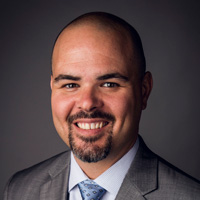What Hidden Obstacles May Snag Your Retirement? 5 Key Points to Consider
To avoid getting hung up unexpectedly, plan for retirement using the “TRICK” method, which stands for taxes, risk tolerance, investment mix, costs and knowledge gaps.


Profit and prosper with the best of Kiplinger's advice on investing, taxes, retirement, personal finance and much more. Delivered daily. Enter your email in the box and click Sign Me Up.
You are now subscribed
Your newsletter sign-up was successful
Want to add more newsletters?

Delivered daily
Kiplinger Today
Profit and prosper with the best of Kiplinger's advice on investing, taxes, retirement, personal finance and much more delivered daily. Smart money moves start here.

Sent five days a week
Kiplinger A Step Ahead
Get practical help to make better financial decisions in your everyday life, from spending to savings on top deals.

Delivered daily
Kiplinger Closing Bell
Get today's biggest financial and investing headlines delivered to your inbox every day the U.S. stock market is open.

Sent twice a week
Kiplinger Adviser Intel
Financial pros across the country share best practices and fresh tactics to preserve and grow your wealth.

Delivered weekly
Kiplinger Tax Tips
Trim your federal and state tax bills with practical tax-planning and tax-cutting strategies.

Sent twice a week
Kiplinger Retirement Tips
Your twice-a-week guide to planning and enjoying a financially secure and richly rewarding retirement

Sent bimonthly.
Kiplinger Adviser Angle
Insights for advisers, wealth managers and other financial professionals.

Sent twice a week
Kiplinger Investing Weekly
Your twice-a-week roundup of promising stocks, funds, companies and industries you should consider, ones you should avoid, and why.

Sent weekly for six weeks
Kiplinger Invest for Retirement
Your step-by-step six-part series on how to invest for retirement, from devising a successful strategy to exactly which investments to choose.
Whether your retirement is over a decade away or getting close, thorough planning is advisable because without it, you could face significant challenges that may not be top-of-mind now. And those issues down the road may affect the lifestyle you desire.
You could stumble across hidden obstacles on your way to retirement, so it’s important to learn more about the potential roadblocks and take the proper steps now to reduce their impact. You could say there’s a “TRICK” to it – an acronym that lays out five crucial elements to consider in your retirement plan:
‘TRICK’ … ‘T’ Is for Taxes
Most people don't take taxes in retirement into consideration as much as they should. If they have sizable amounts of money in pre-tax accounts, as many do with traditional 401(k)s, that money is going to be taxed when withdrawn. Required minimum distributions (RMDs) at age 72 can cause tax problems if the issue is not addressed ahead of time.
From just $107.88 $24.99 for Kiplinger Personal Finance
Become a smarter, better informed investor. Subscribe from just $107.88 $24.99, plus get up to 4 Special Issues

Sign up for Kiplinger’s Free Newsletters
Profit and prosper with the best of expert advice on investing, taxes, retirement, personal finance and more - straight to your e-mail.
Profit and prosper with the best of expert advice - straight to your e-mail.
Converting some of that pre-tax money to Roth IRAs or Roth 401(k)s can be an effective way to reduce the tax burden in retirement. The “trick” is doing the conversion strategically over a number of years and knowing how much to convert each time. The converted amount is taxable each year, but Roth IRAs and Roth 401(k)s are tax-free when withdrawn starting at age 59½, although the accounts also must be held for at least five years. There is no requirement to start taking RMDs from a Roth IRA, whereas there is with a Roth 401(k), but account holders can roll that into a Roth IRA.
Qualified Charitable Distributions (QCDs) are another way to potentially reduce the tax burden of an RMD. You can make a QCD by having your IRA custodian pay part or all of your RMD to a qualified 501(c)(3) charity. The total yearly maximum contribution for QCD is $100,000, and to make a QCD you have to be at least 70½ years of age.
‘R’ Is for Risk Tolerance
Ask yourself: Do you think we could go through another financial crisis like we did in 2008? A big downturn could happen at some point, and if it does, how much would you lose? More specifically, how much could you afford to lose? Whatever that number is, you need to be comfortable with it.
When working with a financial planner, address your risk tolerance and try to balance it between being too risky and too conservative. You most likely will want growth in your investments, but you will want to have a protective mindset for some of your assets as well.
‘I’ Is for Investment Mix
Investments are like different types of tools that are fit for certain types of jobs. For example: If you’re cutting down a shrub, you don’t use a rake. A common problem in the financial industry is you have some people who are basically trying to sell you a product, and you end up trying to rake leaves with a shovel. They’re trying to sell you something, whereas an independent adviser focuses on investments that are based on your specific financial goals.
Still, different products can serve you depending on what you want. Bank-type products including savings accounts, money market accounts and certificates of deposit (CDs) won’t lose money, but they’re probably not going to grow very well. Another type of tool is stock market-based accounts. They can grow very well and are used for long-term growth. But they’re probably not going to be safe; you can’t be guaranteed you won’t lose money at some point, and having success in stocks often means sticking with them over the long haul.
A third tool includes insurance-based solutions: indexed annuities or indexed life insurance. There can be reasonable growth in those vehicles and they’re safe, and they are contractually guaranteed not to lose money. (Guarantees are backed by the financial strength of the issuing company. Products are not bank or FDIC insured.) But there’s usually a time commitment involved.
‘C’ Is for Costs
Clients should have full disclosure about how their advisers’ and account managers’ compensation, commissions and fees work. What’s in it for those people watching your money? Some of these fees are clearly displayed, like with a mutual fund account. But others are hidden or not disclosed as openly. Some financial professionals get a percentage, some work on a retainer. As the consumer, it’s empowering to know how advisers and account managers are paid.
‘K’ Is for Knowledge Gaps
We live in an age when many consumers like to try to do things themselves, but financial planning isn’t like a home improvement video where you can learn how to add a room to your house for half the cost of a contractor. Your financial future and retirement planning take special care that an experienced professional can handle. Consumers are planning their retirement for the first time, but seasoned planners do it for a living and should know the hidden obstacles and how to help maneuver around them. Clients can gain greatly from the adviser’s experience.
Working on your retirement portfolio now can help you see the hidden obstacles well ahead of time. To get where you want to go, you have to know what could stop you and the right moves that will help make your retirement ride as smooth and enjoyable as possible.
Dan Dunkin contributed to this article.
Investment advisory services made available through AE Wealth Management LLC (AEWM). AEWM and NuVenture Financial Group LLC are not affiliated companies.1405765 – 7/22
Investing involves risk, including the potential loss of principal. Any references to [protection benefits, safety, security, lifetime income, etc] generally refer to fixed insurance products, never securities or investment products. Insurance and annuity product guarantees are backed by the financial strength and claims-paying ability of the issuing insurance company.
Our firm is not affiliated with or endorsed by the U.S. government or any governmental agency. Neither the firm nor its agents or representatives may give tax or legal advice. Individuals should consult with a qualified professional for guidance before making any purchasing decisions.
Please remember that converting an employer plan account to a Roth IRA is a taxable event. Increased taxable income from the Roth IRA conversion may have several consequences, including (but not limited to) a need for additional tax withholding or estimated tax payments, the loss of certain tax deductions and credits, and higher taxes on Social Security benefits and higher Medicare premiums. Be sure to consult with a qualified tax adviser before making any decisions regarding your IRA.
The appearances in Kiplinger were obtained through a PR program. The columnist received assistance from a public relations firm in preparing this piece for submission to Kiplinger.com. Kiplinger was not compensated in any way.
Profit and prosper with the best of Kiplinger's advice on investing, taxes, retirement, personal finance and much more. Delivered daily. Enter your email in the box and click Sign Me Up.

Bob Horne is CEO/president of NuVenture Financial Group. A 20-year veteran of the financial services industry, including seven years as an investment adviser representative, Horne served as an assistant vice president and branch manager for HSBC Bank before focusing on retirement planning. He has passed his Series 6, 63 and 65 securities exams and carries a life, health and annuity license in Florida. Horne has also obtained the Retirement Income Certified Professional® (RICP®) certification.
-
 The Cost of Leaving Your Money in a Low-Rate Account
The Cost of Leaving Your Money in a Low-Rate AccountWhy parking your cash in low-yield accounts could be costing you, and smarter alternatives that preserve liquidity while boosting returns.
-
 I want to sell our beach house to retire now, but my wife wants to keep it.
I want to sell our beach house to retire now, but my wife wants to keep it.I want to sell the $610K vacation home and retire now, but my wife envisions a beach retirement in 8 years. We asked financial advisers to weigh in.
-
 How to Add a Pet Trust to Your Estate Plan
How to Add a Pet Trust to Your Estate PlanAdding a pet trust to your estate plan can ensure your pets are properly looked after when you're no longer able to care for them. This is how to go about it.
-
 How to Add a Pet Trust to Your Estate Plan: Don't Leave Your Best Friend to Chance
How to Add a Pet Trust to Your Estate Plan: Don't Leave Your Best Friend to ChanceAdding a pet trust to your estate plan can ensure your pets are properly looked after when you're no longer able to care for them. This is how to go about it.
-
 Want to Avoid Leaving Chaos in Your Wake? Don't Leave Behind an Outdated Estate Plan
Want to Avoid Leaving Chaos in Your Wake? Don't Leave Behind an Outdated Estate PlanAn outdated or incomplete estate plan could cause confusion for those handling your affairs at a difficult time. This guide highlights what to update and when.
-
 I'm a Financial Adviser: This Is Why I Became an Advocate for Fee-Only Financial Advice
I'm a Financial Adviser: This Is Why I Became an Advocate for Fee-Only Financial AdviceCan financial advisers who earn commissions on product sales give clients the best advice? For one professional, changing track was the clear choice.
-
 I Met With 100-Plus Advisers to Develop This Road Map for Adopting AI
I Met With 100-Plus Advisers to Develop This Road Map for Adopting AIFor financial advisers eager to embrace AI but unsure where to start, this road map will help you integrate the right tools and safeguards into your work.
-
 The Referral Revolution: How to Grow Your Business With Trust
The Referral Revolution: How to Grow Your Business With TrustYou can attract ideal clients by focusing on value and leveraging your current relationships to create a referral-based practice.
-
 This Is How You Can Land a Job You'll Love
This Is How You Can Land a Job You'll Love"Work How You Are Wired" leads job seekers on a journey of self-discovery that could help them snag the job of their dreams.
-
 65 or Older? Cut Your Tax Bill Before the Clock Runs Out
65 or Older? Cut Your Tax Bill Before the Clock Runs OutThanks to the OBBBA, you may be able to trim your tax bill by as much as $14,000. But you'll need to act soon, as not all of the provisions are permanent.
-
 The Key to a Successful Transition When Selling Your Business: Start the Process Sooner Than You Think You Need To
The Key to a Successful Transition When Selling Your Business: Start the Process Sooner Than You Think You Need ToWay before selling your business, you can align tax strategy, estate planning, family priorities and investment decisions to create flexibility.